Gardening can be a deeply rewarding endeavor that offers relaxation, stress relief, and the opportunity to grow your own fruits, vegetables, and flowers. To create a thriving garden, it is important to have a solid foundation of knowledge in gardening fundamentals. This includes understanding the basics such as choosing the right location for your garden, selecting the right plants for your climate and soil conditions, preparing the soil with organic matter, and proper planting techniques.
It is also important to monitor and manage pests, provide adequate care and attention to your plants, and learn watering and nutrient management techniques. Planning your garden involves considering plant choice, garden structure, and proper placement to ensure your plants receive adequate sunlight and drainage.
Key Takeaways:
- Gardening fundamentals are essential to create and maintain a beautiful garden.
- Choosing the right location, selecting suitable plants, preparing the soil, proper spacing and planting depth, and monitoring pests are some of the key areas to focus on.
- Providing adequate care, learning watering and nutrient management techniques, and proper garden planning are also important to ensure healthy plant growth.
Choosing the Right Location for Your Garden
When starting a garden, one of the fundamental aspects to consider is choosing the right location, as it plays a crucial role in the success of your plants and the overall health of your garden. The first consideration is finding a sunny spot that receives at least 6-8 hours of direct sunlight daily to ensure proper growth of plants. Sunlight exposure is a crucial factor when starting a garden. Without sufficient sunlight, plants won’t be able to photosynthesize, which means they won’t be able to produce the energy they need to grow.
In addition to sunlight, you also need to select plants that are suited for your climate and soil conditions. Certain plants thrive better in different climates and soil types, so it’s important to choose the right plants for your garden to ensure optimal growth. To prepare the soil, it’s essential to amend it with organic matter, such as compost, to provide the necessary nutrients for plants to grow.
Proper spacing and depth when planting is essential in preventing overcrowding and promoting healthy growth. Too many plants in one area can lead to competition for resources, which can result in stunted growth and poor health. Monitoring and managing pests is crucial for maintaining a healthy garden, and natural methods or chemical treatments can be used when necessary. Adequate watering, fertilizing, and pruning are also critical for plant care and should be done regularly.
When planning your garden, consider the types of plants you want to grow and the structure of your garden, such as raised beds, in-ground planting, or containers. Proper placement is also vital, taking into account sunlight and drainage. With proper planning and preparation, gardening can be a rewarding and enjoyable activity with numerous benefits, both physical and emotional.
Breaking free from preconceived notions about gardening and experimenting with different plants and techniques can enhance the experience. Lastly, try to focus on the process and have fun with your garden, expressing yourself and appreciating its beauty.

Selecting Suitable Plants for Your Climate and Soil Conditions
Understanding the basics of gardening includes selecting plants that are well-suited for your climate and soil conditions, ensuring their health and successful growth. Before starting your garden, research the specific needs of your desired plants, such as appropriate planting times and watering requirements. It’s also important to assess and prepare your soil, as the ideal soil should be well-draining and rich in organic matter.
To determine the suitability of your soil, conduct a soil test, which can provide valuable information on nutrient levels and pH. Consider the types of plants that thrive in your region and soil conditions when planning your garden. For low-maintenance options, a gravel garden or vertical garden might be suitable.
| Plant Type | Soil Type | Climate |
|---|---|---|
| Roses | Well-draining soil with pH range of 6.0-7.0 | Warm and sunny |
| Tomatoes | Sandy loam with pH range of 6.0-6.8 | Warm and sunny |
| Lettuce | Fertile soil with pH range of 6.0-7.0 | Cool and moist |
Proper placement is also crucial, considering the sunlight and drainage requirements of your plants. Watering techniques include using a watering can and applying mulch to retain moisture. Nutrient management can be done using natural elements like coffee grounds or eggshells.
Gardening provides numerous benefits, such as physical, mental, and emotional well-being, and connecting with nature. To get started, consider these essential gardening knowledge and beginner’s guide to gardening when selecting suitable plants for your climate and soil conditions.
Preparing the Soil with Organic Matter
An essential gardening technique that beginners should prioritize is preparing the soil with organic matter, as it lays the foundation for healthy plant growth and thriving gardens. Start by choosing the right location for your garden that receives sufficient sunlight and analyzing the soil to test nutrient levels and pH. Researching the specific needs of your desired plants can also provide valuable information.
Amending the soil with organic materials, such as compost, manure, or other natural matter, can create an optimal environment for plant growth. These materials add essential nutrients to the soil and improve drainage, allowing roots to absorb water and nutrients more efficiently. Organic matter also promotes beneficial microbial activity in the soil, which helps break down organic matter and releases nutrients.
Proper spacing and planting depth are crucial to avoid overcrowding, which can lead to poor plant growth and disease. When planting, ensure that the plants are placed at the correct depth and distance from each other. Regular monitoring and management of pests using natural methods or chemical treatments are necessary to ensure plant health.
Adequate care, including watering, fertilizing, and pruning, is critical for plant health. Plants need the right balance of nutrients, which can be achieved with organic elements like coffee grounds or eggshells, to foster growth. Mastering proper watering techniques and using mulch to retain moisture can also help plants thrive. Planning the garden structure and placement of plants based on sunlight and drainage are important for success.
Overall, incorporating organic matter into the soil is an essential element in gardening that beginners must prioritize for healthy plant growth. With the right care and attention using natural methods, gardening can be an enjoyable, rewarding, and beneficial practice for physical and mental health. So, get started, and don’t be afraid to experiment and share gardening content to spread knowledge and help others discover the joys of gardening.
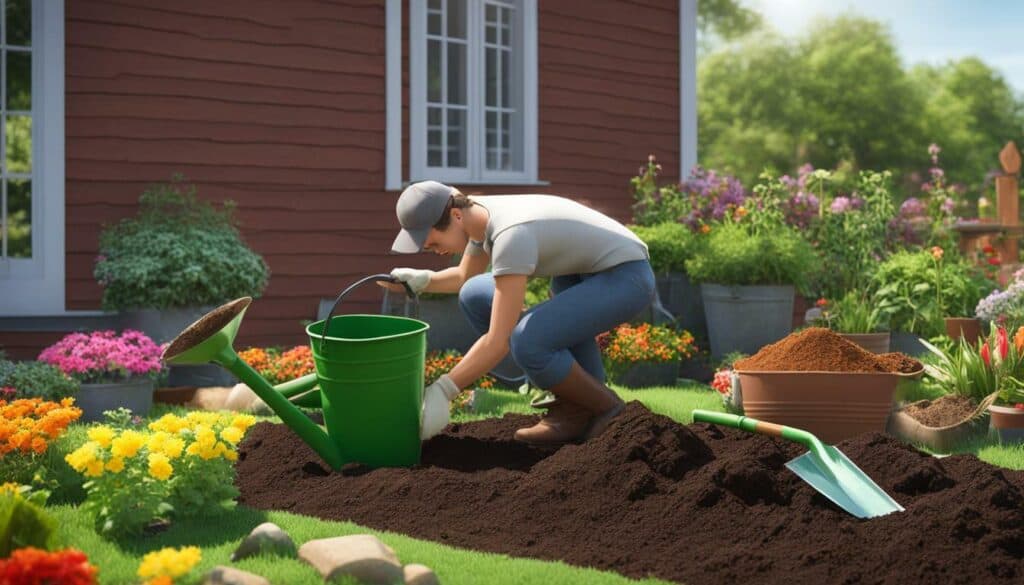
Proper Spacing and Planting Depth
To ensure the success of your garden, it is crucial to understand the significance of proper spacing and planting depth, as it creates favorable conditions for your plants to thrive. When starting a garden, it is important to choose a sunny spot with at least 6-8 hours of direct sunlight daily. Different plants have specific spacing and planting depth requirements, and overcrowding can lead to poor growth, disease, and pests.
It is recommended to follow the recommended guidelines for each plant, whether planting seeds or seedlings. For example, some plants require more space than others, while some need to be planted deeper or shallower than others. These guidelines can be found on seed packets or online resources and are essential to ensure that your plants have enough space and nutrients to grow and produce healthy produce.
Monitoring and managing pests, providing adequate watering and fertilizing, and proper soil preparation are also vital for plant health. By understanding these basics, one can create a thriving and enjoyable gardening experience. So make sure to take the time to properly space out your plants and plant them at the right depth for optimal growth and harvest!
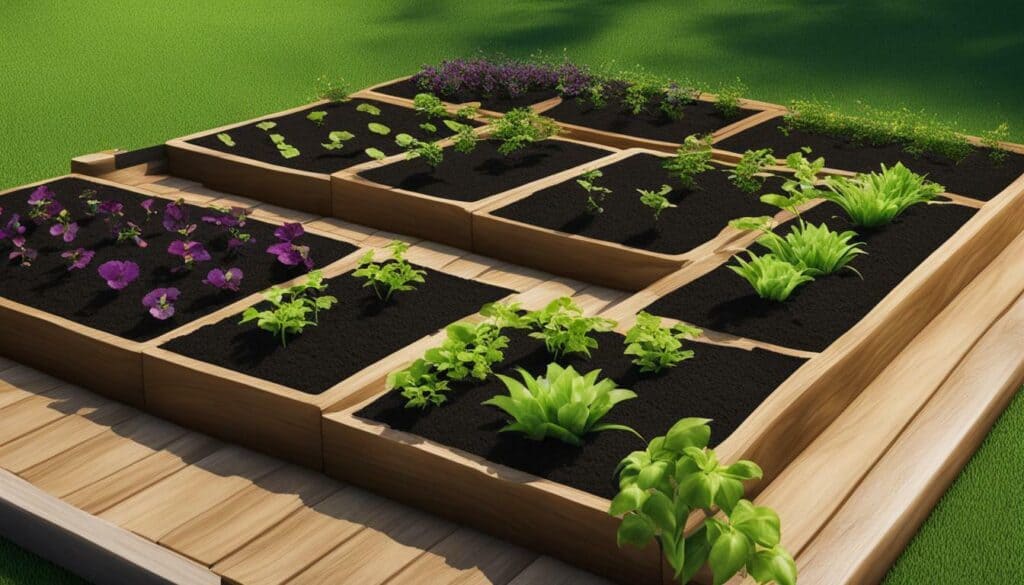
Remember, gardening can be a fun and rewarding activity, but it requires some knowledge and effort. Don’t be afraid to ask for help or advice, and keep learning as you go. By incorporating these essential gardening knowledge and techniques into your routine, you can grow your own healthy produce and enjoy the beauty of nature.
Monitoring and Managing Pests Naturally
Understanding how to monitor and manage pests naturally is an essential aspect of plant care, as it ensures a balanced and thriving garden ecosystem. When starting a garden, choosing the right location that receives adequate sunlight is key. Researching and selecting plants that are suitable for your climate and soil conditions is crucial to their survival.
Soil preparation and testing play a significant role in ensuring optimal growth for your plants. To monitor pests, regularly inspect your plants for signs of damage or infestation. Natural methods like including pest-repellent plants such as lemon balm can be effective in managing pests naturally.
Proper watering, fertilizing, and pruning techniques are essential for plant care. Water your plants regularly, depending on their specific needs. Choosing the appropriate fertilizers and using organic matter can aid in natural pest management. Pruning helps to stimulate growth, remove dead or diseased material and maintain plant health.
By following these introductory gardening tips and basics of gardening care, you can create and maintain a healthy and pest-free garden ecosystem, without the need for harmful chemicals.
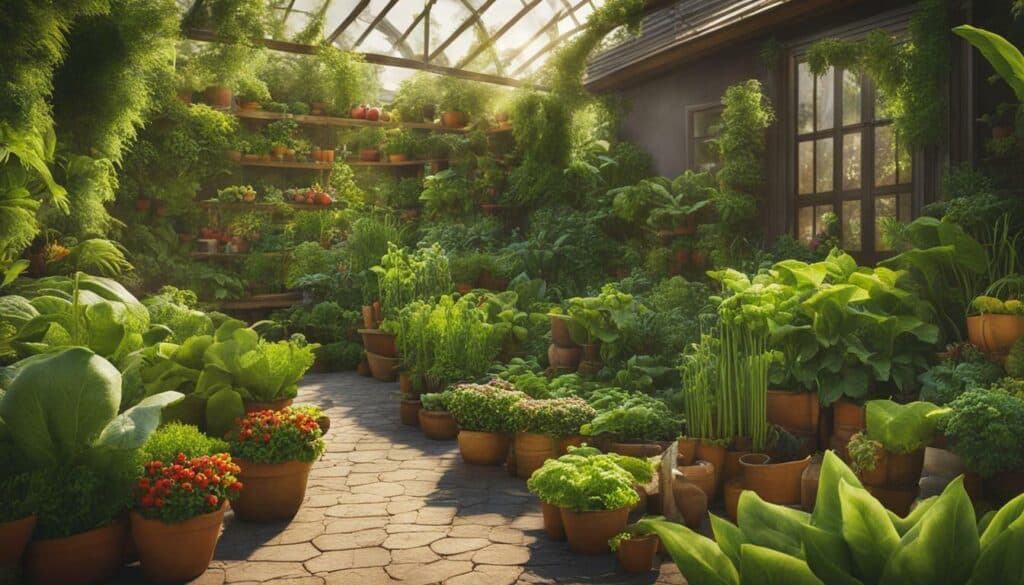
Providing Adequate Care Through Watering, Fertilizing, and Pruning
To provide adequate care for your plants, it is vital to understand the essential tasks of watering, fertilizing, and pruning, allowing them to flourish and thrive. Proper watering techniques ensure that your plants receive enough moisture and prevent root rot. Using a watering can or hose, water your plants deeply and regularly, giving them the hydration they need to grow. Incorporate mulch around the base of your plants to help retain moisture and maintain an even soil temperature.
Nutrient management is another critical aspect of plant care. By providing your plants with the nutrients they need, they can grow stronger and healthier. Natural elements such as coffee grounds or eggshells can provide essential nutrients, while organic fertilizers can help supplement soil conditions where necessary.
Proper pruning techniques help promote healthy plant growth and prevent diseases. By removing dead or damaged branches, you can stimulate new growth and prevent the spread of infection. Regularly removing spent flowers can also encourage further blooms and promote overall plant health.
As you care for your plants, it’s important to pay attention to their individual needs. Some plants may require more watering or fertilization than others, while pruning and trimming needs may vary depending on the type of plant. With adequate care and attention, your garden will thrive and reward you with beautiful blooms and bountiful harvests.
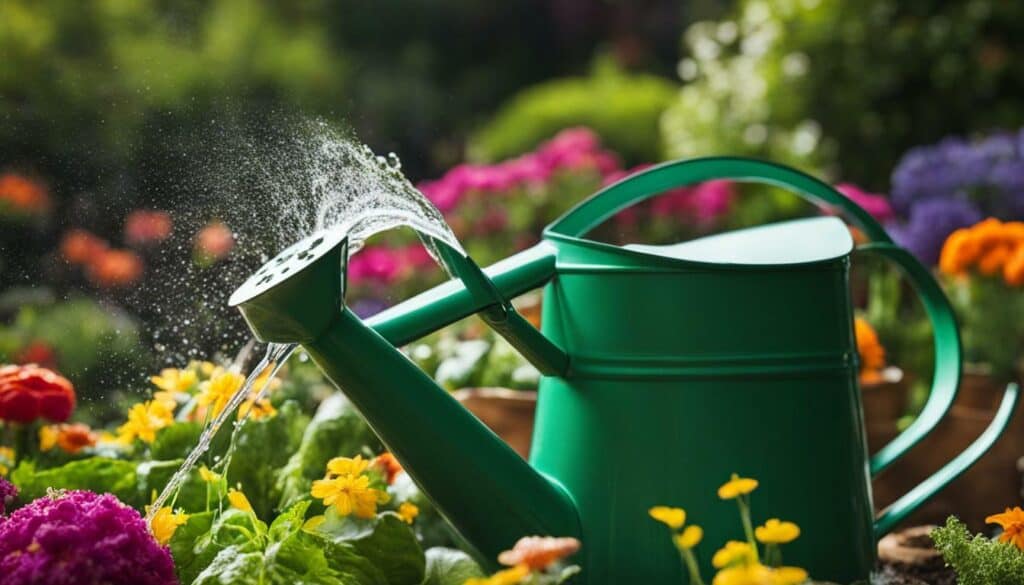
Planning the Garden Structure and Placement
An important aspect of starting a garden is planning its structure and placement, as an organized and well-thought-out layout can enhance the beauty and functionality of your outdoor space. When selecting a location, consider factors such as sunlight exposure and soil quality. A garden should ideally receive 6-8 hours of direct sunlight daily, so choose an area that meets this requirement, or consider using artificial lighting for indoor gardens.
Understanding plant care basics is also key when selecting a location. Consider the type of plants suited for your climate and soil conditions, and prepare the soil by assessing its drainage and nutrient levels. Adding organic matter to the soil can improve its texture, fertility, and water retention.
| Tip | Description |
|---|---|
| Spacing and Planting Depth | Follow the spacing and planting depth guidelines for seeds or seedlings to ensure optimal growth. |
| Natural Pest Control | Monitor and manage pests using natural methods or chemical treatments. |
| Proper Watering Techniques | For successful plant care, master proper watering techniques and use mulch to retain moisture. |
Understanding companion planting and selecting plants suitable for your region and soil conditions can also maximize plant growth. When planning your garden, decide on the structure, such as raised beds, in-ground planting, or containers. Proper placement is vital, ensuring that plants receive adequate sunlight and avoiding areas prone to water pooling.

By considering these factors, you can create a beautiful and thriving garden space that adds beauty and functionality to your outdoor area.
The Benefits of Gardening
Gardening goes beyond the act of growing plants; it offers a multitude of benefits for physical and mental well-being, contributing to a healthier and happier life. As individuals, we often lead hectic lives and are disconnected from nature. Gardening provides an opportunity to connect with the earth and learn self-reliance. It is a form of exercise that promotes flexibility and strength, and is a natural stress reliever, providing an outlet for relaxation and peacefulness.
Understanding the fundamentals of gardening and plant care is essential in unlocking the full benefits of this hobby. Knowing how to choose the right location, select appropriate plants, and prepare the soil are all crucial aspects of gardening. Monitoring and managing pests naturally and providing adequate care, from watering to fertilizing and pruning, are also important.
Planting and maintaining a garden is a constant learning process that requires patience and commitment. However, the rewards are plentiful. Fresh herbs, fruits and vegetables, and beautiful flowers are just a few of the tangible benefits that a garden can provide. The feeling of accomplishment and pride that comes with growing your own produce or creating a beautiful garden space cannot be overstated.
Breaking free from preconceived ideas and experimenting with different techniques and plant choices is an exciting aspect of gardening. Whether you are creating a small container garden or a large outdoor space, the possibilities are endless. With careful planning and attention to detail, a garden can become a personal sanctuary.
Overall, gardening is a hobby that provides a sense of purpose, connection with nature, and contributes to a healthier lifestyle. Embrace the journey, enjoy the process, and appreciate the beauty that gardening has to offer.
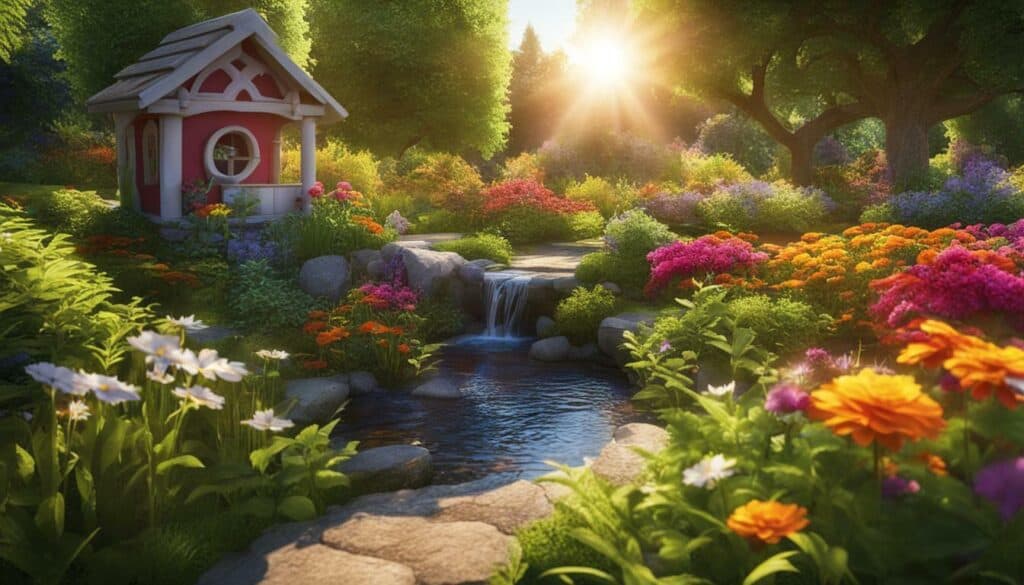
Breaking Free from Preconceived Ideas
When it comes to gardening, breaking free from preconceived ideas opens up a world of possibilities and allows for a truly enjoyable and rewarding experience. Many people have the notion that gardening is complicated and time-consuming. However, understanding basic gardening techniques is key to successful gardening. This includes plant care essentials such as watering, feeding, and pest control.
As a beginner, it’s important to select a suitable location for your garden and be willing to experiment and learn new things. Don’t be afraid to try out different techniques and approaches. Gardening can be a fun and relaxing hobby that offers infinite opportunities for creativity.
By focusing on the process rather than the results, and appreciating the beauty of your garden, you can experience the true joy that gardening has to offer. And don’t forget about the physical and mental health benefits that gardening provides. It’s a great way to reduce stress and promote relaxation while getting some exercise and connecting with nature.
So, if you’re new to gardening, don’t let preconceived ideas hold you back. With some introductory gardening tips and a willingness to learn, you can unlock the full potential of this fulfilling hobby and enjoy all the benefits it has to offer.
Focusing on the Process and Appreciating the Beauty
In the world of gardening, it is essential to shift the focus from solely achieving the end result and instead embrace the process, learning, and finding beauty in every stage. Understanding plant care basics, selecting the right location, and experimenting with different plants are all part of the process of creating a flourishing garden.
Proper care and attention to plants through watering, fertilizing, and pruning are also significant aspects of gardening. By providing adequate care, individuals can enjoy a beautiful, healthy garden all year round.
It is important to remember that experimenting and expressing creativity can enhance the enjoyment of gardening. Breaking free from preconceived notions about gardening and embracing the process can lead to new discoveries and a deeper appreciation for nature’s beauty.
Gardening can bring a wealth of benefits to physical, mental, and emotional well-being. Relaxation, enjoying nature, and expressing creativity are just a few of the positive aspects of this rewarding activity.
By focusing on the process of gardening and appreciating the beauty of the garden, individuals can experience a deeper connection with nature and reap the rewards of their efforts.
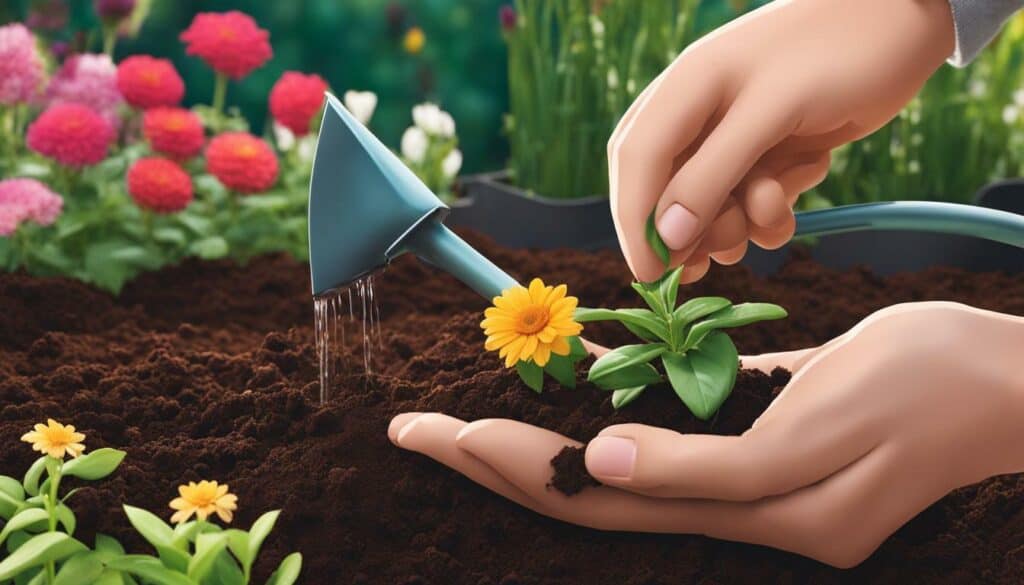
“In every gardener there is a child who believes in The Seed Fairy.” – Robert Brault
Conclusion
Gardening fundamentals serve as the gateway to unlock nature’s beauty right in your backyard, allowing you to create a vibrant and thriving oasis where plants flourish and you find joy, peace, and fulfillment. As we’ve discussed, understanding the basics of plant care, selecting the right plants for your garden, and planning your garden layout are crucial steps for success. Proper watering and nutrient management, as well as natural pest control, are also essential for maintaining a healthy garden.
But gardening doesn’t have to be complicated. Breaking free from preconceived ideas and experimenting with different plants and designs can make it more enjoyable. Remember to focus on the process and find joy in every step, from planting to pruning.
Above all, gardening offers numerous benefits that can positively impact your physical and mental well-being. From relaxation and stress relief to supplying homegrown produce, gardening has something to offer for everyone. By sharing this article, we can spread the word about the magic of having a green thumb and inspire others to discover the rewards of gardening.
FAQ
Q: What are gardening fundamentals?
A: Gardening fundamentals refer to the basic knowledge and techniques that beginners should learn to establish a strong foundation in gardening. They include various areas such as choosing the right location for a garden, selecting suitable plants for the climate and soil conditions, preparing the soil with organic matter, proper spacing and planting depth, monitoring and managing pests naturally, providing adequate care through watering, fertilizing, and pruning, and planning the garden structure and placement.
Q: Why is choosing the right location important for a garden?
A: Choosing the right location for a garden is crucial because it determines the success of plant growth. Factors such as sunlight exposure and soil quality play a significant role in the health and productivity of plants. Understanding plant care and the essentials of gardening will help beginners make informed decisions when selecting a location for their garden.
Q: How do I select suitable plants for my climate and soil conditions?
A: To select suitable plants for your specific climate and soil conditions, it is essential to have a basic understanding of gardening. Consider factors such as temperature ranges, rainfall patterns, and soil pH. Researching and consulting local gardening resources can help you identify plants that will thrive in your environment.
Q: Why is it important to prepare the soil with organic matter?
A: Preparing the soil with organic matter is crucial because it improves soil structure, fertility, and nutrient-holding capacity. Organic matter provides essential nutrients for plants, enhances water retention, and promotes beneficial microbial activity. Incorporating organic matter into the soil before planting will lead to healthy plant growth and overall garden success.
Q: What is the significance of proper spacing and planting depth?
A: Proper spacing and planting depth are important for plant growth because they ensure adequate access to sunlight, water, and nutrients. Crowded plants compete for resources and may not reach their full potential. On the other hand, planting too shallow or too deep can affect root development. Following guidelines and recommendations for spacing and planting depth will create optimal conditions for plant growth.
Q: How can I monitor and manage pests naturally in my garden?
A: Monitoring and managing pests naturally is an essential aspect of gardening. Start by regularly inspecting plants for signs of pest infestation. Encourage natural predators such as ladybugs and birds to control pests. If intervention is necessary, use organic pest control methods like insecticidal soaps and neem oil. Avoid harmful chemicals that can harm the environment and beneficial insects.
Q: What are the key aspects of watering, fertilizing, and pruning?
A: Watering, fertilizing, and pruning are important aspects of plant care in gardening. Water plants deeply and evenly, considering factors such as plant type and soil moisture. Choose appropriate fertilizers based on plant nutrient requirements and apply them according to instructions. Prune plants to remove dead or damaged parts, promote growth, and shape the plant for aesthetic purposes.
Q: Why is planning the garden structure and placement important?
A: Planning the garden structure and placement is important because it maximizes space utilization, sunlight exposure, and visual appeal. Consider factors such as plant height, spread, and growth habits when designing the layout. A well-planned garden will be organized, functional, and visually pleasing.
Q: What are the benefits of gardening?
A: Gardening offers numerous physical and mental well-being benefits. It reduces stress, provides exercise, and promotes relaxation. Gardening also fosters a connection with nature and offers a sense of fulfillment and accomplishment. Enjoying the beauty of the garden and the process of gardening itself can bring joy and satisfaction.
Q: How can I break free from preconceived ideas in gardening?
A: To break free from preconceived ideas in gardening, embrace experimentation and creativity. Don’t be afraid to try new techniques or approaches. Gardening is a learning process, and by being open to new ideas and being willing to adapt, you can discover new joys and achieve greater success in your garden.
Q: Why should I focus on the process of gardening and appreciate the beauty?
A: Focusing on the process of gardening rather than just the end result allows for a more fulfilling experience. Embrace the journey, learn from mistakes, and find joy in every step. Additionally, take the time to appreciate the beauty of your garden, from the growth and bloom of plants to the serenity and tranquility of nature it provides.
What Are the Essential Elements of a Beginning Garden Plan?
A green thumb garden plan includes essential elements that contribute to a successful beginning garden. These elements involve careful consideration of the garden’s location, sunlight exposure, soil quality, and water supply. Additionally, selecting appropriate plants, creating a layout design, and implementing maintenance strategies are crucial for nurturing a thriving garden from the start. Proper planning sets the stage for a flourishing green thumb garden.
Source Links
- https://outdoorgoodness.com/gardening-tips-and-ideas/
- https://abmeyerwood.com/discover-the-magic-behind-having-a-green-thumb-break-free-from-preconceived-ideas-about-gardening/
- https://www.amazon.com/Complete-Vegetable-Gardeners-Bible-Books/dp/B0C2RF55QD
- https://www.gardenfundamentals.com/
- https://www.almanac.com/vegetable-gardening-for-beginners
- https://organicgardeningacademy.com/p/beginning-gardener-fundamentals
- https://www.hunker.com/13731392/how-to-choose-the-best-location-for-your-garden
- https://sebsnjaesnews.rutgers.edu/2020/04/choosing-the-right-location-for-your-vegetable-garden/
- https://morningchores.com/vegetable-garden-location/
- https://morningchores.com/choosing-garden-plants/
- https://extension.okstate.edu/fact-sheets/basic-plant-care-understanding-your-plants-needs.html
- https://www.canr.msu.edu/resources/a_guide_for_the_selection_and_use_of_plants_in_the_landscape_e2941
- https://www.gardendesign.com/soil/
- https://extension.usu.edu/yardandgarden/research/preparing-and-improving-garden-soil
- https://www.planetnatural.com/garden-soil/
- https://web.extension.illinois.edu/firstgarden/fundamentals/ruler.cfm
- https://www.gardenbetty.com/plant-spacing/
- https://www.thespruce.com/how-deeply-should-seeds-be-planted-2539711
- https://content.ces.ncsu.edu/extension-gardener-handbook/8-integrated-pest-management-ipm
- https://joegardener.com/podcast/identifying-controlling-garden-pests-susan-mulvihill/
- https://www.ams.usda.gov/sites/default/files/media/Organic Pest Management_FINAL.pdf
- https://www.leaflimb.com/proper-care-new-trees/
- https://www.leaflimb.com/how-to-the-fundamentals-of-watering/
- https://bonnieplants.com/blogs/garden-fundamentals/the-basics-of-fertilizing
- https://www.gardenfundamentals.com/sun-mapping-garden/
- https://bonnieplants.com/blogs/garden-fundamentals/lay-vegetable-garden
- https://diabetes.org/healthy-living/fitness/benefits-of-gardening
- https://greenthumbgardeningsecrets.com/the-fundamentals-of-gardening/
- https://www.lifespan.org/lifespan-living/gardening-and-its-many-benefits
- https://www.treehugger.com/challenging-preconceived-notions-vital-for-gardeners-7488305
- https://newmobility.com/accessible-gardening/
- https://njaes.rutgers.edu/fs1211/
- https://joegardener.com/podcast/fundamentals-of-gardening-confidence-through-key-principles/
- https://joegardener.com/podcast/no-dig-gardening-charles-dowding/
- https://www.gardentrellis.co.uk/page/news/view/the-fundamentals-of-sustainable-gardening-an-introduction
- https://www.asiafarming.com/backyard-gardening-basics-tips-and-ideas-what-every-gardener-should-know
- https://www.theartofsimple.net/5-gardening-basics-for-beginners/

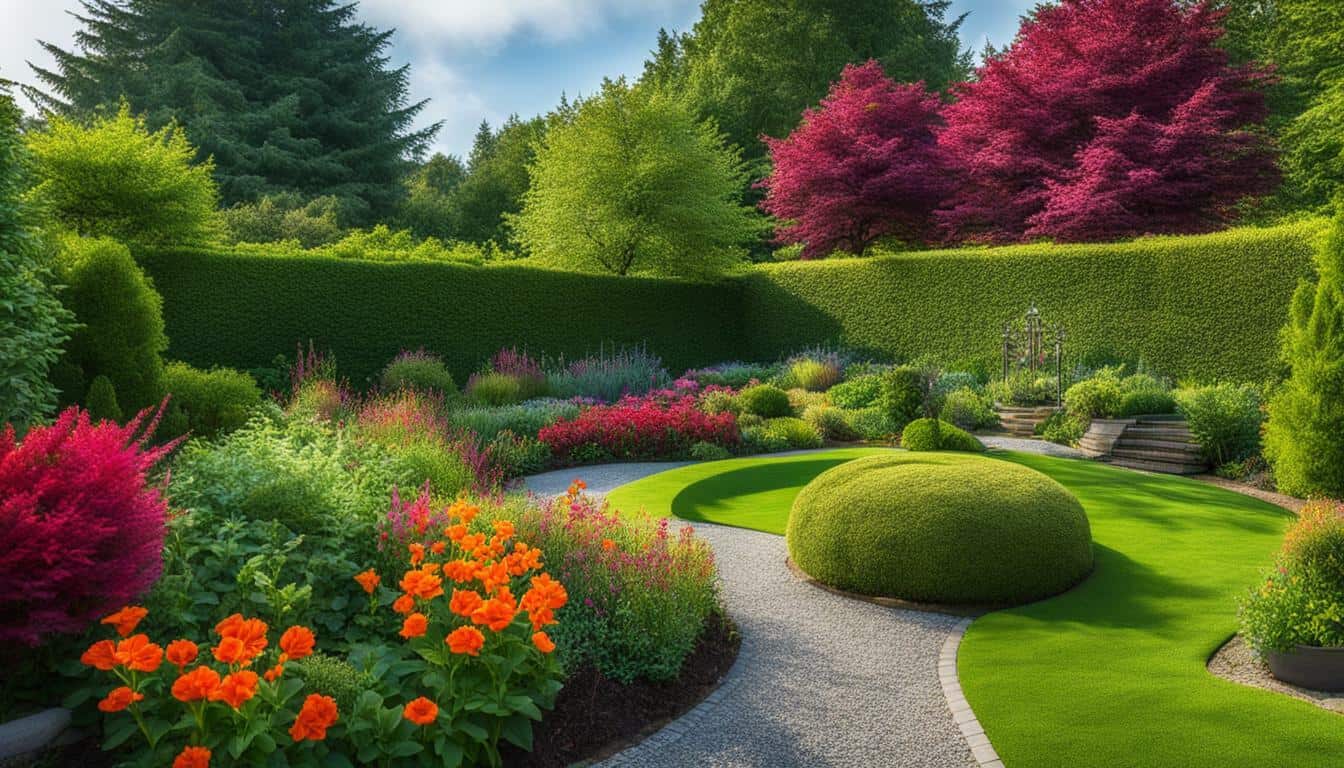
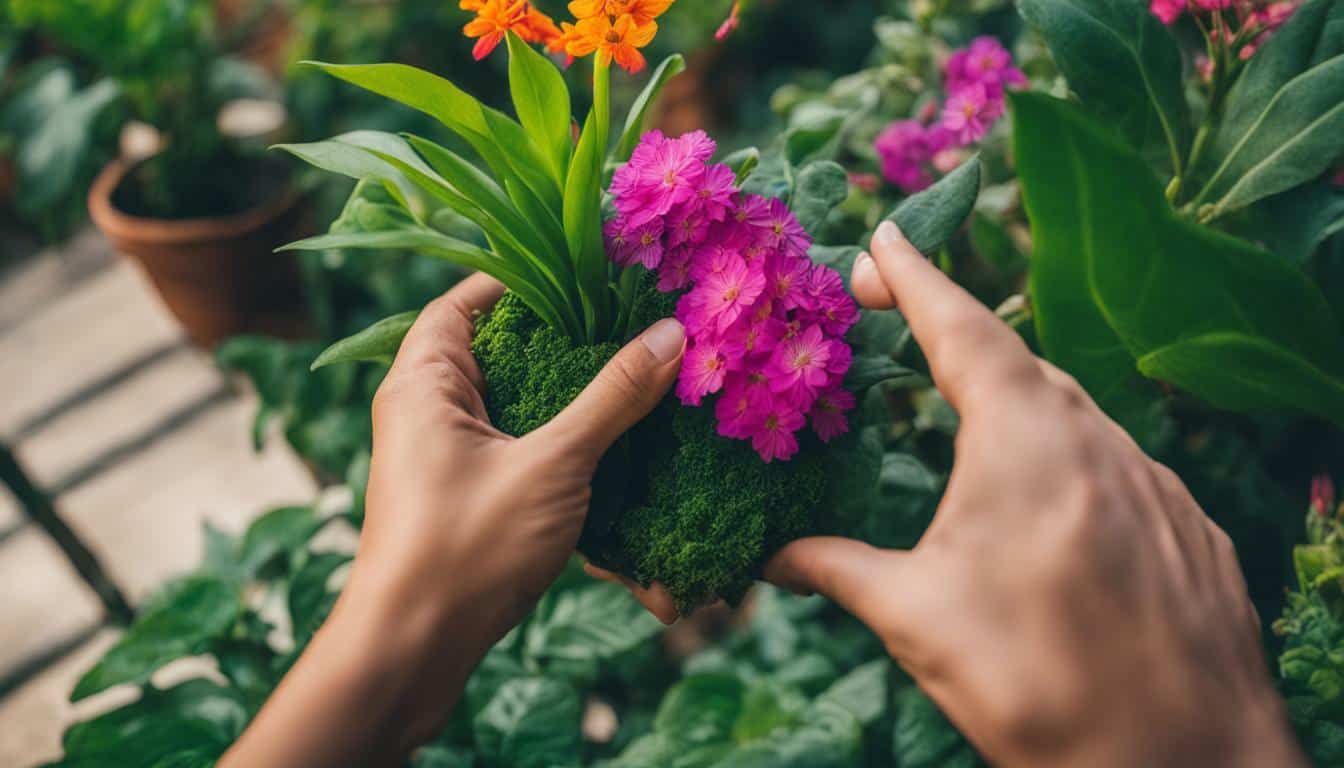
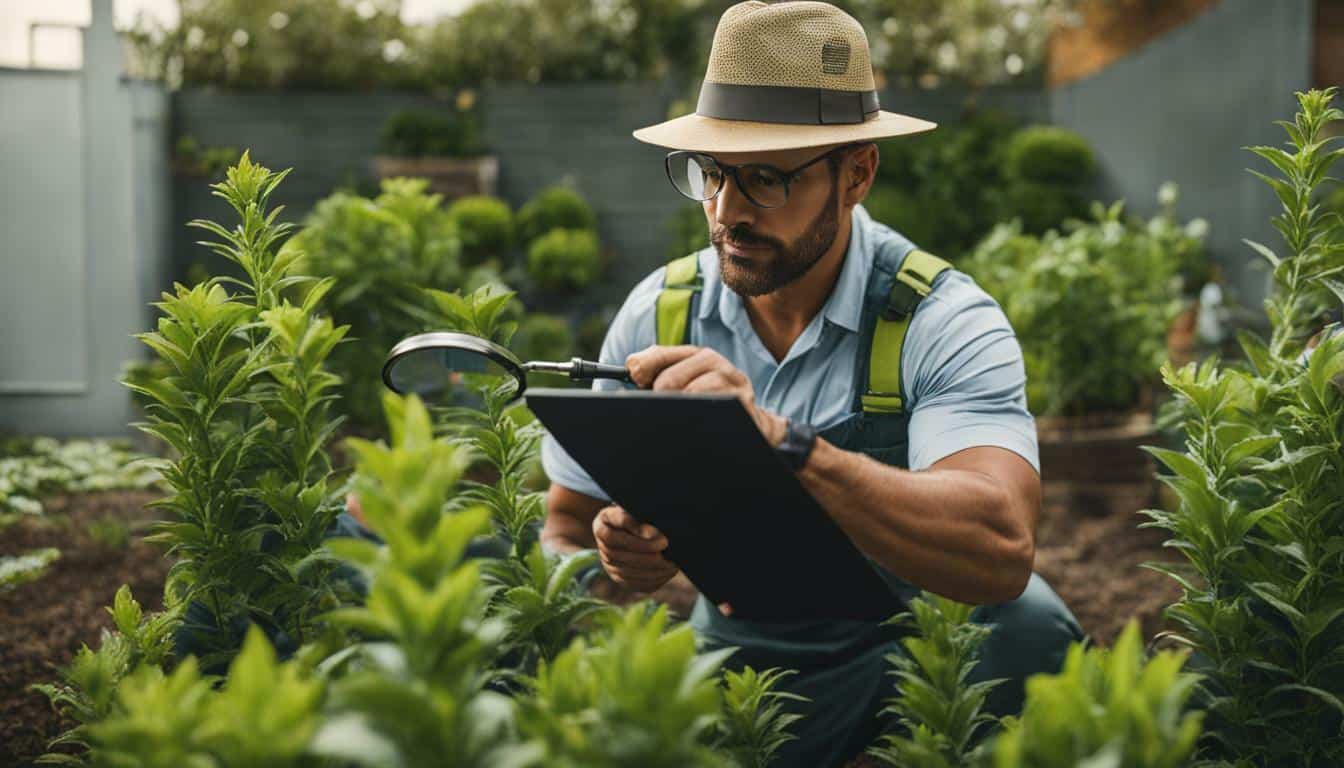

Leave a Reply